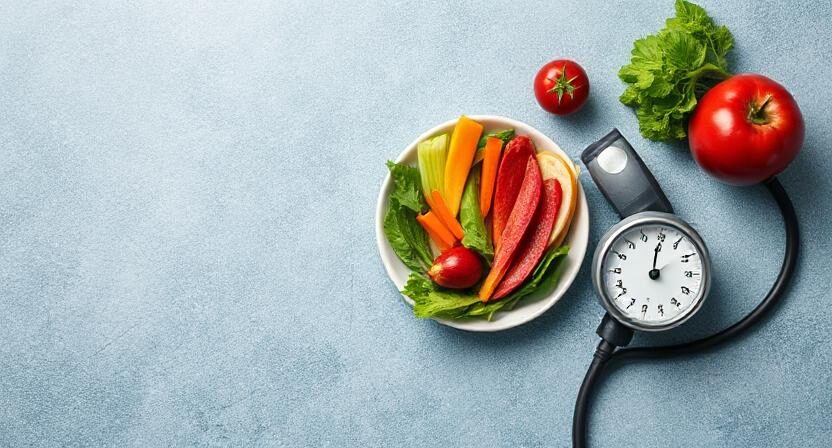Why Tart Cherry Is the…
Blog by Sherry Larson Why Tart Cherry Is the Natural…
Table of Contents
Toggle
High blood pressure (hypertension) is a global health crisis, increasing the risk of heart disease, stroke, and kidney failure. While medications can help manage blood pressure, dietary and lifestyle changes are essential for long-term cardiovascular health. An anti-inflammatory diet, rich in whole foods and devoid of processed ingredients, plays a crucial role in regulating blood pressure by improving vascular function and reducing systemic inflammation.
Inflammation is the body’s natural defense mechanism against infections and injuries. However, chronic inflammation—often driven by poor diet, stress, and environmental toxins—can damage blood vessels, leading to hypertension.
Endothelial Dysfunction: The endothelium, the inner lining of blood vessels, regulates blood flow and pressure. Chronic inflammation impairs its function, making arteries stiff and less responsive to relaxation signals.
Oxidative Stress: Excessive free radicals can damage arterial walls, reducing nitric oxide availability, which is necessary for blood vessel dilation.
Atherosclerosis Development: Persistent inflammation promotes plaque buildup in arteries, narrowing them and increasing blood pressure.
Increased Sodium Sensitivity: Chronic inflammation may impair the kidneys’ ability to excrete sodium, leading to fluid retention and elevated blood pressure.
A diet rich in antioxidants, healthy fats, fiber, and gut-friendly foods can combat inflammation and support cardiovascular health.
Antioxidants counteract oxidative stress, preventing endothelial dysfunction and promoting better blood flow. Key antioxidants include:
Vitamin C (Citrus fruits, bell peppers, strawberries)
Vitamin E (Nuts, seeds, leafy greens)
Polyphenols (Berries, dark chocolate, green tea, red wine in moderation)
Carotenoids (Carrots, sweet potatoes, tomatoes)
Healthy fats help regulate inflammation and maintain optimal blood vessel function:
Omega-3 Fatty Acids: Found in fatty fish (salmon, mackerel, sardines), flaxseeds, and walnuts, omega-3s lower inflammation and improve blood vessel elasticity.
Monounsaturated Fats: Olive oil, avocados, and nuts help reduce oxidative stress and promote heart health.
Avoid Trans Fats and Excess Omega-6s: Processed foods, fried items, and excessive vegetable oils can contribute to inflammation.
A healthy gut microbiome is essential for inflammation control. Beneficial bacteria produce short-chain fatty acids (SCFAs) that lower inflammation and support endothelial function.
Probiotic-Rich Foods: Yogurt, kefir, sauerkraut, kimchi, miso
Prebiotic Foods: Garlic, onions, asparagus, bananas, oats
High-Fiber Foods: Whole grains, legumes, vegetables, and fruits enhance gut microbiome diversity.
Leafy Greens (Spinach, kale, Swiss chard): High in potassium, which helps regulate sodium levels.
Berries: Packed with polyphenols that reduce arterial stiffness.
Fatty Fish: Rich in omega-3s that combat inflammation.
Garlic and Onions: Contain sulfur compounds that support heart health.
Nuts and Seeds: Almonds, walnuts, and flaxseeds are nutrient-dense with anti-inflammatory properties.
Dark Chocolate (85% or higher cocoa): Contains flavonoids that improve circulation.
Green Tea: Loaded with catechins, which reduce blood pressure and inflammation.
Processed and Fast Foods: High in trans fats, sodium, and preservatives.
Refined Sugars and Carbohydrates: White bread, pastries, and sugary beverages spike blood sugar and inflammation.
Excessive Red and Processed Meats: Linked to inflammation and arterial damage.
Alcohol in Excess: Increases oxidative stress and raises blood pressure.
Artificial Trans Fats: Found in margarine, fried foods, and many processed snacks.
While diet plays a pivotal role in reducing inflammation and managing blood pressure, lifestyle habits can further enhance cardiovascular health.
Poor sleep disrupts circadian rhythms and elevates cortisol levels, contributing to hypertension. Aim for 7-9 hours of restful sleep by:
Maintaining a consistent sleep schedule
Avoiding screens before bed
Creating a relaxing nighttime routine
Dehydration thickens blood and makes it harder for the heart to pump efficiently, leading to increased blood pressure. Drink at least 8 glasses of water daily and consume hydrating foods like cucumbers, watermelon, and citrus fruits.
Chronic stress increases inflammatory markers and blood pressure. Incorporate stress management techniques such as:
Meditation and Deep Breathing: Helps lower cortisol levels.
Regular Physical Activity: Exercise enhances circulation and reduces inflammation.
Spending Time in Nature: Exposure to greenery and sunlight improves mental well-being and cardiovascular function.
Social Connections: Strong relationships reduce stress and promote a healthier heart.
Adopt the Mediterranean Diet: Focus on whole foods, healthy fats, lean proteins, and fiber-rich carbohydrates.
Use Herbs and Spices: Turmeric, ginger, and cinnamon have anti-inflammatory properties.
Plan Balanced Meals: Combine proteins, healthy fats, and fiber to stabilize blood sugar and prevent inflammation spikes.
Limit Processed Foods: Stick to natural, unprocessed ingredients for optimal heart health.
Stay Consistent: Small, consistent dietary changes yield long-term benefits.
An anti-inflammatory diet is a powerful tool for regulating blood pressure and promoting overall heart health. By focusing on whole, nutrient-dense foods and minimizing inflammatory triggers, you can significantly reduce hypertension risk. Complementing dietary efforts with healthy lifestyle habits—such as quality sleep, hydration, and stress reduction—further enhances cardiovascular well-being. Adopting these science-backed strategies ensures long-term heart health and vitality.
Blog by Sherry Larson Berberine: Nature’s Secret Weapon for Blood Sugar, Inflammation & More If you’re looking for…
Blog by Sherry Larson Shilajit: Nature’s Ancient Energy Tonic for Modern Burnout We’ve all felt it—that sluggish, wired-but-tired…
Blog by Sherry Larson Celery Juice: The Gut-Healing, Liver-Loving Morning Ritual You Didn’t Know You Needed If you’ve ever felt…
Blog by Sherry Larson Milk Thistle: The Detox Defender Your Liver Has Been Waiting For Milk thistle might…
Blog by Sherry Larson The Link Between Ultra-Processed Foods and Cancer: What They’re Not Telling You Every day,…
Blog by Sherry Larson Understanding High Cortisol: Signs, Causes, and Natural Ways to Balance It Cortisol, commonly known…
Blog by Sherry Larson The Truth About Red Meat and Health: Why the Real Culprit May Not Be What You…
Blog by Sherry Larson The Hidden Dangers of Diet Cola: What You Need to Know Diet cola has…
Blog by Sherry Larson 14 Ways to Begin Healing Your Gut and Transform Your Health …
copyright © 2025 Anti-Inflammatory Approach. All rights reserved. Unauthorized reproduction, distribution, or use of any content, including text, images, recipes, or other materials on this website, is strictly prohibited without prior written permission. This website’s content is provided for informational purposes only and does not constitute medical or professional advice.